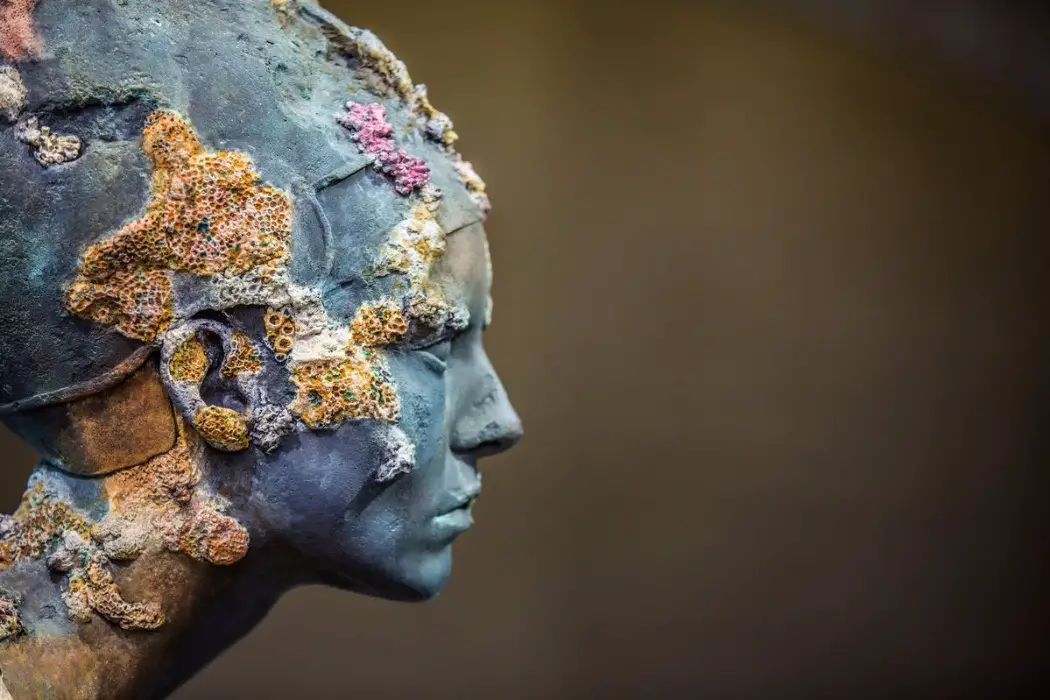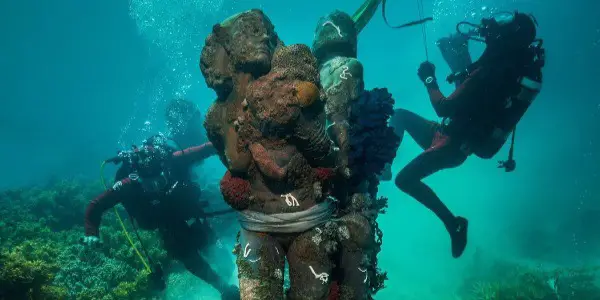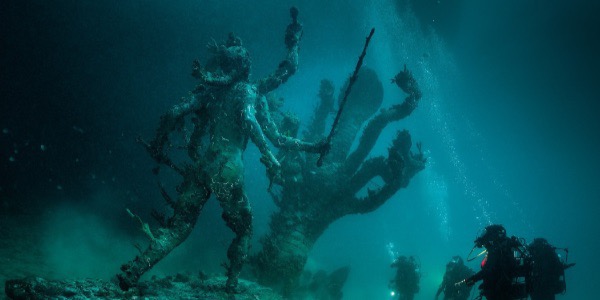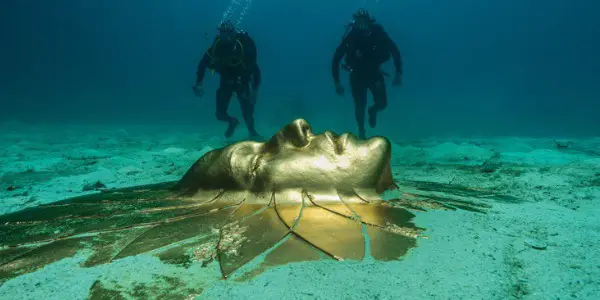TREASURES FROM THE WRECK OF THE UNBELIEVABLE: A Beautiful Deception

Stephanie Archer is 39 year old film fanatic living in…
Hidden treasures of the deep, a fascination that envelopes the minds of many in wonder. The Titanic, the Britannica, war ships and lost pirate treasures are only some examples of numerous wrecks that have been searched for and studied to no end, their discovery a treasure of its own as well as the contents they may contain. Shipwrecks have always been a personal fascination of mine, my childhood filled with every book and film regarding the Titanic I could get my hands on – a fascination I know I share with many.
While scrolling through Netflix’s suggestions of films I may like, I stumbled on to Treasures from the Wreck of the Unbelievable. I was ecstatic and dove right into the mystery of a sunken ship lost for centuries off the coast of South Africa. While there were moments I found myself questioning the skill of the videographers (seemingly too good to be true) and the quality of the interviews, I was mesmerized, unable to turn away until the film’s conclusion. Sadly, this is where the glory ends.
My fascination with this new wreck was quickly snuffed out as Google quickly revealed it to be nothing more than a mockumentary, a film created and designed to encourage the purchase of art.
The Unbelievably Fake Wreck
Following the breadcrumbs initiated by the discovery of an ancient statue in a fishing net, a team of scientists begin the path to the ultimate historical find. Off the coast of South Africa, it is discovered that a treasure trove of history and fortune may lie beneath the surface – a shipwreck lost to time and history. Seeking the financial backing of artist Damien Hirst, who had begun creating his fortune in the 1990s by selling a shark immersed in formaldehyde, they begin scoping the ocean floor – each new discovery leading to seemingly historical and archaeological revelations.

Statues buried under sand and coral are viewed with human eyes for the first time as divers carefully document each piece. As they are slowly salvaged and cleaned off, the cultural difference of each piece begins to form an idea, a new concept on the history of man and oceanic travel. Throughout the entire collection, pieces are discovered to have come from not one place, or a similar grouping of places, but from a variety of countries and continents. There are pieces from various parts of India, Rome and Africa (to name a few). What these scientists and immersed artists come to realize is that the idea of man during the Roman Empire, an earlier on, being confined to certain areas of the world was no longer true. That man (specifically merchants) had the ability to reach farther than their confined shores, capable of expansive nautical travel. This ship was a key piece of history no one even knew existed.
As the underwater excavation continues on, however, stone carvings would not be the only items these men would find. Gold relics and a mythological tale of a lost ancient ship could threaten the safety of the wreck, the crew and history.
Creating a Lie: If it’s to good to be true…
After my discovery, I looked at the summary page on Netflix and there it was, listed under genre – mockumentary. I was shocked and appalled that I had been lead so falsely. This beautifully crafted film with treasures in the knowledge it had to share was nothing but a lie. Watching the film, there had been several moments when my fiancé and I questioned how shots were made and the luck that the videographer had had being in the right place at the right time. Now in retrospect, it all makes sense – it was staged. But why such an elaborate get up?

Damien Hirst is one of the wealthiest artists in the UK, quite possibly the richest artist to date, his artwork many times finding its inspiration in death. His best selling artwork includes mainly animals submerged in formaldehyde, sometimes whole sometimes dissected, as well as a human skull encrusted with flawless diamonds. While this was not his only avenue of artistic expression, it was what he is best known for. As mentioned in the Treasures from the Wreck of the Unbelievable, he was known as the “shark guy”.
He devised a crafty idea of creating a fake documentary surrounding the discovery of a historically monumental find hidden beneath the waters off the coast of Africa. With this beautifully shot film, he would be able to promote the “artifacts” salvaged from the ocean floor and encourage both archaeologists, historians, curious minds and art collectors to visit his upcoming gallery in Venice, Italy. Not just to see the treasures time once forgot, but to purchase. This elaborate ploy was a film cleverly disguised as the ultimate artistic advertisement.
What Did Work?
This was all for naught. While I have been discouraged from loving this film based on the revelation of its inaccuracy, I cannot deny that it was beautifully shot. The underwater footage is remarkable, each angle slowly revealing details of each underwater treasure, as if you were one of the divers on screen.

Cinematography from Tim Cragg heightens the direction of Sam Hobkinson, the combination of sweeping shots slowly lighting and lifting the underwater veil. As the explorers dive deeper into the depths of their treasure and the depths of the waters, each of these elements continue to blend and heighten one another, creating an ascetically pleasing work of cinematic art.
My only critique with the filming of The Unbelievable was the approach and media used for this seemingly immersive experience. While it was filmed and distributed through a widely popular streaming service, it might have found a better platform as a VR experience, bringing viewers further into the depths of discovery, just a finger’s touch from feeling as though they were really there. Even as just an additive to the art gallery showcase, VR would have heightened the experience of this artistic expression/advertisement, bridging the gap between film and show.
Treasures from the Wreck of the Unbelievable: Conclusion
While my love for this film was quickly swept away with the tides of knowledge, I cannot help but tip my hat to the mesmerizing cinematography and filming Treasures from the Wreck of the Unbelievable had to showcase. There was significant cinematic craftsmanship that went into the making of this film and while its subject matter was nothing more than an artistic ploy, it is beautiful to behold.
Viewers who enter this film may get a different take, possibly finding a different appreciation in its structure and attempt to bring the contemporary art world into the cinematic one. They may even catch the filmmakers and the individuals mimicking the audience, dropping breadcrumbs of their own to help you discover the true nature of the film.
While Treasures from the Wreck of the Unbelievable may be a wreck of its own, there are hidden treasures within that do deserve discovery.
Have you seen Treasures from the Wreck of the Unbelievable? Tell us what you thought in the comments below!
Treasures from the Wreck of the Unbelievable is currently streaming on Netflix.
Does content like this matter to you?
Become a Member and support film journalism. Unlock access to all of Film Inquiry`s great articles. Join a community of like-minded readers who are passionate about cinema - get access to our private members Network, give back to independent filmmakers, and more.












